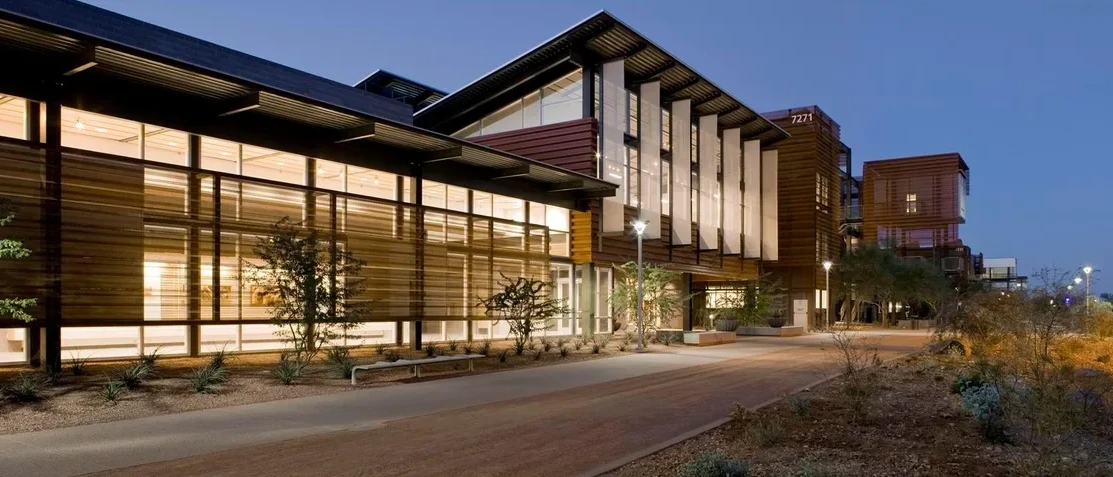

Arizona State University (Polytechnic Campus)
Sustainable Food Systems, BS
Study detals
: Bachelor's degree : Sustainable Food Systems, BS SUSFOSYSBS : Full time : 48 MonthRequirements
Academic requirements
First-year students must:
- Have a 3.00 grade point average (GPA) (a "B" or better where "A"=4.00) from a secondary school. Some ASU programs may have higher admission or English proficiency requirements and may consider a minimum ACT or SAT score.
- Must have three years of high school coursework. (If you are currently in high school, ASU needs to see 9–11 grade coursework. If you have completed high school, ASU needs to see 10–12 grade coursework.)
- Must have and present a completed high school diploma or certificate.
Conditional admission
ASU may offer conditional undergraduate admission to international applicants to an on-campus program who meet the academic (aptitude) requirements but who are not proficient in English. This offer of conditional admission will give you time to improve your English proficiency before you start classes at ASU. Your conditional admission offer is good for up to three semesters, during which time you must meet one of these requirements to begin your ASU experience.
Competency requirements
International students who completed high school outside the U.S. are required to meet the following competency requirements:
- Math: four years (algebra I, geometry, algebra II and one course requiring algebra II as a prerequisite).
- Laboratory science: three years total (one year each from any of the following areas are accepted: biology, chemistry, earth science, integrated sciences and physics).
Provide evidence of English language proficiency (TOEFL 61)
Speciality
This program may be eligible for an Optional Practical Training extension for up to 24 months. This OPT work authorization period may help international students gain skills and experience in the U.S. Those interested in an OPT extension should review ASU degrees that qualify for the STEM-OPT extension at ASU's International Students and Scholars Center website.
The OPT extension only applies to students on an F-1 visa and does not apply to students completing a degree through ASU Online.
Also available online
Additional information
Program description
The BS program in sustainable food systems trains students to understand food-related challenges using a food systems lens, which encompasses the many aspects of food and agriculture within an integrated social and environmental context and empowers students to grapple with modern complexities. Students become effective agents of change.
Coursework covers a wide range of topics, such as nutrition science, agricultural production, economics and social justice. Students are encouraged to select electives that build upon core sustainable food systems coursework.
Students are engaged in an active community collectively working to achieve the 2030 United Nations Sustainable Development Goals. Beyond the core subject matter and skills courses, the degree requirements include an internship, a chosen focus area and a culminating project-based course, all of which provide students in-depth knowledge of a food-related subfield and ample preparation for exciting careers.
Concurrent program options
Students pursuing concurrent degrees (also known as a “double major”) earn two distinct degrees and receive two diplomas. Working with their academic advisors, students can create their own concurrent degree combination. Some combinations are not possible due to high levels of overlap in curriculum.
Accelerated program options
This program allows students to obtain both a bachelor's and master's degree in as little as five years. It is offered as an accelerated bachelor's plus master's degree with:
- Sustainable Food Systems, MS
Acceptance to the graduate program requires a separate application. Students typically receive approval to pursue the accelerated master’s during the junior year of their bachelor's degree program.
Global opportunities
Global experience
With more than 300 Global Education program opportunities available to them, students of all majors, including programs in the College of Global Futures, are able to tailor their experience to their specific interests and skill sets. Whether in a foreign country, in the U.S. or online, students build communication skills, learn to adapt and persevere, and are exposed to research and internships across the world, increasing their professional network.
Students can find programs specific to their interests on the College of Global Futures Study Abroad webpage and additional opportunities and information on the ASU Global Education Office website. These sites also include additional information about applying for funding to support global travel.
Graduates have a broad understanding of sustainable food systems and are prepared for pursuing careers in areas such as:
- agricultural development and poverty alleviation --- contributing to projects enhancing agricultural practices in underserved regions and fostering economic growth and food security
- community food systems management --- leading initiatives promoting local and sustainable food systems, tackling diet-related health issues and advocating for healthier food choices
- food entrepreneurship and marketing --- starting sustainable food ventures, innovating in product development, and engaging in marketing and agribusiness to promote eco-friendly food products
- food literacy --- educating communities on sustainable food choices, cultivating awareness and responsible consumption habits
- public policy and advocacy --- advocating for sustainable food policies, participating in governance and leading grassroots movements for change
- resource management for sustainable food production --- playing a vital role in sustainable resource management, safeguarding the environment during food production